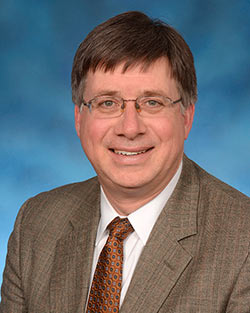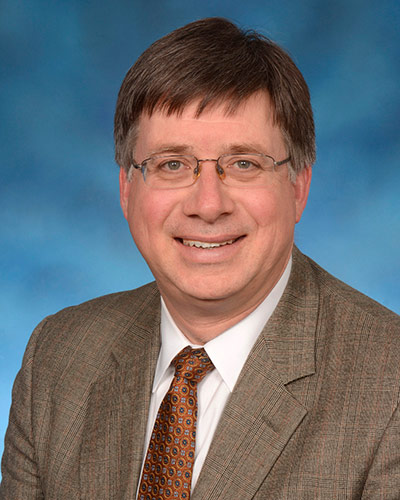February 07, 2017

Dr. Thomas Hornyak Named Chair, with Dr. Zaineb Makhzoumi Serving as New Chief of Clinical Services
University of Maryland School of Medicine (UM SOM) Dean E. Albert Reece, MD, PhD, MBA, announced today that Thomas J. Hornyak, MD, PhD, an Associate Professor of Dermatology at the School of Medicine, and internationally recognized physician-scientist in pigment cell biology, melanoma and skin cancer, has been named the new Chairman of the Department of Dermatology at UMSOM. He will also serve as Chief of Dermatology at the University of Maryland Medical Center (UMMC).  In addition, Zaineb Makhzoumi, MD, MPH, an Assistant Professor of Dermatology at UM SOM, and skin cancer surgeon, has been named the Department’s Chief of Clinical Services.
In addition, Zaineb Makhzoumi, MD, MPH, an Assistant Professor of Dermatology at UM SOM, and skin cancer surgeon, has been named the Department’s Chief of Clinical Services.
“We are fortunate to have Dr. Hornyak, a widely-respected physician-scientist, to provide strong leadership in raising the Department of Dermatology’s overall profile – but particularly in expanding its research portfolio,” said Dean Reece, who is also the Vice President for Medical Affairs, University of Maryland, and the John Z. and Akiko K. Bowers Distinguished Professor. “With Dr. Makhzoumi providing leadership in Clinical Services, we have a powerful combination to propel this Department forward in new and innovative ways. I am confident that we will set a new standard for translational and discovery-based medicine in the field of dermatology,” he said.
Scott Strome, MD, currently Professor and Chair, UM SOM’s Department of Otorhinolaryngology—Head and Neck Surgery, has served as Interim Chair of Dermatology over the past several months. “I must extend my sincerest and deepest gratitude to Dr. Strome, for doing an excellent job as he assumed interim leadership of this Department, resulting in significant changes and advances in the Department’s clinical and educational programs. The School of Medicine is most grateful to him for his dedicated and effective leadership,” Dean Reece added.
New Energy in the Department
Dr. Hornyak will become the Dr. Joseph W. Burnett Distinguished Professor and Chair in Dermatology. Dr. Burnett was the founding Chair of the UM SOM Department of Dermatology. Dr. Hornyak will also remain in his role as Associate Chief of Staff for Research and Development and Chief of Dermatology at the Baltimore Veterans Affairs Medical Center (VAMC).
In his new position as Associate Professor and Chair, Dr. Hornyak will work to recruit new faculty, create new programs focused on general dermatology, melanoma and skin cancer, expand collaborative research projects, and foster educational opportunities for medical students and residents. He will work collaboratively with Dr. Makhzoumi to expand clinical services for the Department locally and around the state.
Dr. Hornyak is widely published in the field of melanocyte stem cells and melanocyte differentiation. An academic leader in his field, he was recently elected President of the Pan-American Society for Pigment Cell Research (PASPCR). He has an MD degree, and a PhD degree in Biological Chemistry, both from the University of Michigan. He was an intern in the Department of Medicine at New York Hospital - Cornell University Medical Center from 1992 to 1993; a resident in the Department of Dermatology at New York University Medical Center from 1993 to 1996; an instructor at the Ronald O. Perelman Department of Dermatology at New York University Medical Center from 1996 to 1998; and a Postdoctoral Fellow at the Howard Hughes Medical Institute of New York University Medical Center from 1995 to 1998.
He started his research laboratory as a Senior Staff Investigator and Staff Dermatologist in the Department of Dermatology at the Henry Ford Health System, Detroit, MI, from 1999 to 2003, with an academic appointment as Assistant Professor of Dermatology at Case Western Reserve University in Cleveland, from 2000 to 2003. From 2003 to 2011, he was an investigator in the Dermatology Branch at the National Cancer Institute in Bethesda. In 2011, he became Associate Professor of Dermatology, and Biochemistry and Molecular Biology at the UM SOM, and Chief of Dermatology at the VA. He currently holds an NIH RO1 grant and a VA Merit Award. Dr. Hornyak has authored or co-authored 26 peer-reviewed articles and eight book chapters. Last fall, he chaired the PASPCR annual meeting, which was held in Baltimore.
“The opportunity to lead this department into the future is an extremely exciting one,” said Dr. Hornyak. “The department has a strong tradition of training dermatologists who remain in Maryland to deliver clinical care. I look forward to working with Dr. Makhzoumi to continue this strong clinical tradition while building interactions between the Department of Dermatology, and other clinical and basic departments at UM SOM, to develop unique clinical programs, and to enhance our research contributions to the field of dermatology,” he said.
 Enhancing Clinical Services
Enhancing Clinical Services
In her new role, Dr. Makhzoumi will report to Dr. Hornyak and will take a lead role in clinical operations of the department. She will help recruit new faculty, work to improve clinical services and expand clinical opportunities for the department.
Dr. Makhzoumi is known as an excellent physician and specialist in Mohs Micrographic Surgery and procedural dermatology. Her research focuses on development of skin cancers in organ transplant recipients. She has an MPH degree from The George Washington University and an MD degree from UM SOM. After graduating from UM SOM, she did an internship at Mercy Medical Center in Baltimore, and then pursued a residency at the University of Virginia, where she also served as Chief Resident followed by a fellowship in Mohs Micrographic Surgery at the University of California, San Francisco.
“I am very excited to take on this new role,” said Dr. Makhzoumi. “Our focus will be to foster our national reputation for state-of-the-art clinical care, as well as top quality education for medical students who are interested in dermatology.”
Focus on Skin Cancer
Among other key programs, Dr. Hornyak and Dr. Makhzoumi will work on developing the Program in Cutaneous Oncology, a research and clinical program at the University of Maryland Marlene and Stewart Greenebaum Comprehensive Cancer Center (UMGCCC) that treats patients with both melanoma and non-melanoma skin cancers and conducts clinical research.
“As an NCI-designated Comprehensive Cancer Center, we are focused on building the highest levels of quality and excellence in every area of cancer research, education and patient care,” said Kevin J. Cullen, MD, the Marlene and Stewart Greenebaum Distinguished Professor of Oncology at UM SOM and director of the UMGCCC, which was recently ranked among the top 25 Cancer Centers by U.S. News & World Report. “We look forward to working with Dr. Hornyak and Dr. Makhzoumi to further enhance our ability to translate discoveries in the laboratory into better treatments for skin-related cancer patients in Maryland and beyond. With Dr. Richard Eckert, PhD, Professor and Chair of the Department of Biochemistry and Molecular Biology, they will lead our efforts to develop a full research program in cutaneous malignancies within the Cancer Center.”
 They will also work to expand the existing Dermatology Consulting Service at UMMC – including expanding the outpatient dermatology service and improving care for patients with severe non-cancerous skin diseases, especially autoimmune blistering skin diseases. They will also focus on skin disease prevention, including in organ transplant patients, who are often at high risk of developing skin cancer.
They will also work to expand the existing Dermatology Consulting Service at UMMC – including expanding the outpatient dermatology service and improving care for patients with severe non-cancerous skin diseases, especially autoimmune blistering skin diseases. They will also focus on skin disease prevention, including in organ transplant patients, who are often at high risk of developing skin cancer.
“With this new leadership team in place, we have a tremendous opportunity to transform this department into one of the most comprehensive dermatology programs in the region – a much-needed resource for patients with melanoma, other skin cancers and skin diseases,” said Mohan Suntha, MD, MBA, the Marlene & Stewart Greenebaum Professor of Radiation Oncology at UM SOM and President and Chief Executive Officer of UMMC. “We will be able to offer a wide range of services and exceptional clinical care while continuing to advance the science through research. Our patients stand to reap significant benefits.”
Dean Reece concluded: “We are excited to identify two stellar UM SOM faculty members, who are leaders in both research and clinical care in Dermatology, who will move the Department forward. In particular, we will be able to make a significant impact, not only on common dermatologic diseases, but preventing and treating this common, and potentially fatal, form of cancer that affects millions of Americans each year.”
About the University of Maryland School of Medicine
Commemorating its 210th Anniversary, the University of Maryland School of Medicine was chartered in 1807 as the first public medical school in the United States. It continues today as an innovative leader in accelerating innovation and discovery in medicine. The School of Medicine is the founding school of the University of Maryland and is an integral part of the 11-campus University System of Maryland. Located on the University of Maryland’s Baltimore campus, the School of Medicine works closely with the University of Maryland Medical Center and Medical System to provide a research-intensive, academic and clinically based education. With 43 academic departments, centers and institutes and a faculty of more than 3,000 physicians and research scientists plus more than $400 million in extramural funding, the School is regarded as one of the leading biomedical research institutions in the U.S. with top-tier faculty and programs in cancer, brain science, surgery and transplantation, trauma and emergency medicine, vaccine development and human genomics, among other centers of excellence. The School is not only concerned with the health of the citizens of Maryland and the nation, but also has a global presence, with research and treatment facilities in more than 35 countries around the world. http://medschool.umaryland.edu.
Learn More
• Department of Dermatology
• University of Maryland Marlene and Stewart Greenebaum Comprehensive Cancer Center (UMGCCC)
Contact
Office of Public Affairs
655 West Baltimore Street
Bressler Research Building 14-002
Baltimore, Maryland 21201-1559
Contact Media Relations
(410) 706-5260
Related stories

Monday, May 06, 2019
UMSOM Researchers Discover Certain Skin-Related Stem Cells Could Help in Treating Neurogenerative Diseases
Neurodegenerative diseases like multiple sclerosis (MS) affect millions of people worldwide and occur when parts of the nervous system lose function over time. Researchers at the University of Maryland School of Medicine (UMSOM) have discovered that a type of skin-related stem cell could be used to help regenerate myelin sheaths, a vital part of the nervous system linked to neurodegenerative disorders.
